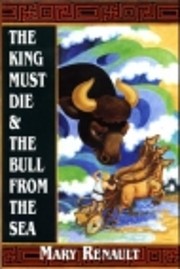

Auf ein Miniaturbild klicken, um zu Google Books zu gelangen.
|
Lädt ... The King Must Die & The Bull from the Seavon Mary Renault
 Keine Keine aktuelle Diskussion zu diesem Buch.   ) )Women beware! Renault is, as a couple of women reviewers say, 'extremely misognynistic'. I read these books following glowing reviews (often by women) on Amazon. Oh, dear! The writing is terse, the scenes are evocative, Theseus comes to life,and I was increasingly dismayed, because of the way in which women are portrayed in these books, and by a woman, too (albeit one whom it seems from Chapman's biography regarded herself as an 'honourary man'). Don't mistake me; I am not so ashistorical in my views as to suppose that a patriarchal king of ancient Greece wouldn't have an awful attitude towards women, regarding them as naturally inferior war prizes, etc. or that Renault, as a woman writing sixty years ago who had rejected the female role wouldn't have some negative views on femaleness, but as I read on I became uncreasingly uneasy, because I felt that Renault was one with Theseus in attitude towards women, and not depicting him ironically at all. The only admirable women in these stories are boyish, or 'chaste' like Hippoylata or the bull dancer Chryse. Sexual women who enjoy being women, like Persephone, Ariadne or Phaedra, are depicted as sly, underhand and generally rather nasty, capable of outbursts of remarkable savagery as in Ariadne's tearing off the poor King For a Year's phallus on Nexos (it is ironical that Theseus abandons her in disgust at this barbarity, yet later enjoys connubial relations with Hippoylata on battlefields strewn with mutilated corpses). Theseus as a boy reminds me of some smug, self- righteous prefect as he complacently reports his heroics as he swaggers along the road to Athens, tipping a bandit of a cliff here, overthrowing a nasty matriarchal society full of downtrodden men and run by an uppity Queen there...Everywhere, women abase themselves before his masculine viriility and men follow his lead like so many sheep (sorry, rams). His obsession with Hippoylata takes up much of 'the Bull from the Sea' . Oddly, in a man meant to be purely heterosexual, his idea woman is muscular and boyish, boyish too in manners. How Hippoylata comes to be so, when she has been raised apart from men, is never explained. His admiration for her is oddly narcissistic, for she has all the qualities that he admires in himself - courage, atheleticism, pride, etc. It goes without saying that she despises her pregnant body and is so wonderful that she only suffers from one bout of morning sickness. A green faced Amazon isn't romantic. After her capture, Hippoylata sees herself as his vassal, and does what she can to promote Theseus' patriarchal rule, including agreeing to his loveless marriage with poor Phaedra, who is accordingly bitter and jealous. In 'The King Must Die' there is a tender scene between the child Phaedra and her bull fighter hero, but the incipient love between the two is never allowed to flourish, I suspect because Renault wished to show the superiority of the mannish character Hippoylata. Thus, while in the legends I believe Theseus deserts the Amazon Queen to marry Phaedra, and outraged, she along with other Amazons fight the Athenians until Hippoylata is killed, Renault will have no such love match with Phaedra for Theseus. She accordingly writes her own version of the legend. Theseus' murder of Phaedra by slow throttling horrified me so much that I did some research on Renault, and discovered the dismal fact that the despised women and her attitude can be summed up in the words 'internalised misogyny'. Because she has for so long been worshipped as an icon by gay men (who probably wouldn't, if they knew her views on gay rights) Renault is, I think, accepted unthinkingly as a person of liberal views, but Chapman's book reveals all too clearly how far from the case that was. These books show a good deal of talent, but nobody can ever write brilliantly when infected by scorn and contempt for anyone, and this treatment of her feminine characters is a blight that spoils these books as far as I am concerned. I know that mine is a minority view; male readers seem either not to see the scorn, or to find it irrelevant, and many women readers seem to enjoy them anyway, but I would be a hypocrite if I gave these better than a one star rating because of it. Jessica Zeige 2 von 2 keine Rezensionen | Rezension hinzufügen
Gehört zur ReiheTheseus Myth (omnibus) Beinhaltet
The story of Theseus--favorite of Poseidon, slayer of the Minotaur, King of Athens. In his own words, he tells of his childhood as the heir of the king of Troizen, how he was sent to Crete to die in the labyrinth, and how he captured and married the Amazon Queen, Hippolyta. Keine Bibliotheksbeschreibungen gefunden. |
Aktuelle DiskussionenKeineBeliebte Umschlagbilder
 Google Books — Lädt ... Google Books — Lädt ...GenresMelvil Decimal System (DDC)813Literature English (North America) American fictionKlassifikation der Library of Congress [LCC] (USA)BewertungDurchschnitt: (3.86) (3.86)
Bist das du?Werde ein LibraryThing-Autor. |
||||||||||||||||||||||||||||||||||||||||||||||||||||||||||||||||||||||||||||||||||||||||||||||||||||||||||||||||||||||||